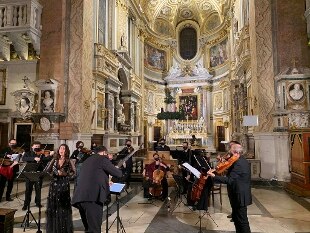Share
02 December 2021 The Rome Baroque Festival is about to start, a concert review dedicated to Italian music of the 16th, 17th and 18th centuries, now a fixed appointment in the capital, now in its 14th edition. The traditional combination of historical spaces of Baroque Rome - Churches, Oratories, noble palaces and historical libraries - and unpublished and / or little performed music remains unchanged. On the part of the organizers, the will to reach a loyal and ever-increasing public, even in the difficult period we are experiencing, remains unchanged; so, as in the previous edition, under the aegis of the motto 'All houses lead to Rome', the review includes live concerts with a small audience, but their diffusion in live streaming for all those who want to immerse themselves in the "places" identity of the Baroque and listen to its music,preceded by precious introductions on the culture itself that created them.
The Festival will open on December 3 with the iconic
Missa Papae Marcelli
by Giovanni Pierluigi da Palestrina. The performance, entrusted to the Festina Lente Ensemble, will be performed with a rich staff of voices and instruments to enhance the sumptuous sounds of the Roman celebrations of the seventeenth century; Michele Gasbarro, the
dominus
of the review
, directs
. If the festive performance brings the Palestrinian mass into a 'corrupted' world with a seventeenth-century aesthetic, the bizarre virtuosity that soprano Paola Valentina Molinari proposes, accompanied by the Ensemble 'Sogno Barocco' directed by Paolo Perrone, complete the panorama of contaminated sacred music definitively from the 'second practice', with a program by GF Haendel and A. Scarlatti (8 December).
Alongside the strictly sacred compositional context, there are two concerts dedicated to secular Roman vocal music of the seventeenth century. The Ensemble 'Lo Specchio di Narciso' with the bass Mauro Borgioni, will perform the unpublished Cantatas by B. Pasquini in the first modern performance (10 December); 'Musica Antiqua Latina' together with the soprano Raffaella Milanesi, will present a musical program inspired by the Roman painter Artemisia Gentileschi (17 December). The task of highlighting the subtle relationships between Roman and French vocal music will instead be entrusted to the prestige of the 'Bach Academie Alden Biesen'. The ensemble, under the direction of Luc Ponet, will perform a program entirely dedicated to musicians from Northern Europe (12 December).
On the instrumental side there are three events dedicated to violin music of the seventeenth-eighteenth century: the concert by Claudio Rado and Julio Caballero Perez, who will present the violin sonatas by JG. Pisander and FM Veracini (7 December); that of the Art of the Arch which, remembering one of the most important patrons of seventeenth-century Rome, will perform the Sonatas by A. Vivaldi for Cardinal Ottoboni (12 December); that of the Ensemble Anima & Corpo directed by Gabriele Pro who, in the first modern performance, will propose the Sonatas of the Romans A. Montanari and G. Mossi (December 14).
Keyboard music includes, as every year, an organ concert in the church of San Pietro in Vincoli.
The uncontaminated sonic charm of seventeenth-century Rome will be recreated by Alessio Colasurdo, at the keyboard of the precious 'Giacomo Alari' organ from 1686 (December 16).
The Roman music is contrasted by the harpsichord concert by Christophe Rousset, one of the best known musicians on the international keyboard scene, performed in the church of San Girolamo della Carità with a program entirely dedicated to seventeenth-century French musicians entitled: 'Paris capital du clavecin' (December 18).

